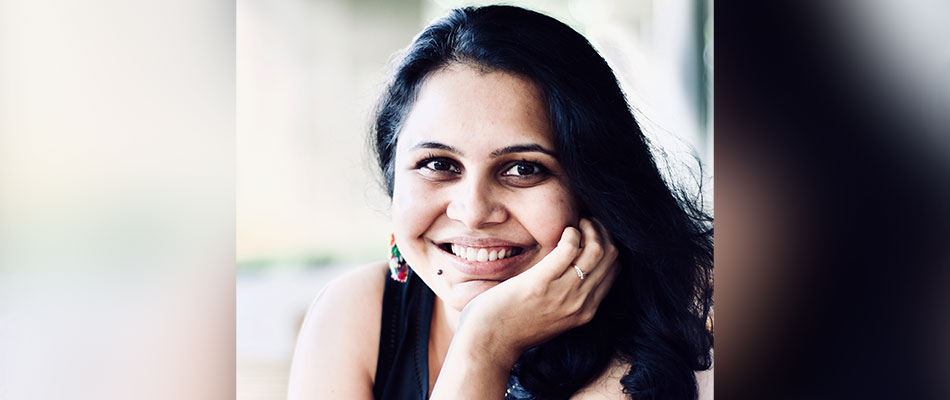Stories are ways that we weave facts into a cohesive narrative that can allow us to be heard.
Good storytelling is more than beautiful language – it is about framing our message in a way that allows our experiences, our values, our hopes, and our needs to become known," says FLAME alumna Jayati Doshi. From her first storytelling project, 'Love, among other things', to founding Sensemaking Lab that works with organizations and communities on changing mindsets and narratives, Jayati's story is built around curiosity and creativity. She narrates the tale of her career journey that is unique in every 'sense'.
The story of Love
What is Love? That universal feeling, which is also felt uniquely by every individual, was the source of the journey of personal exploration and inquiry that Jayati embarked on. It turned into the project 'Love, among other things', which laid the foundation for her later work.
Jayati says, "To talk about love also meant talking about insecurity and abuse, beauty standards and body image, communication and conflict, values and decision-making, caste, class, and gender, and systems and institutions that allowed or prevented certain types of love from existing and lasting."
The project taught Jayati that Love wasn't just about Love but also about relationship skills, ways people made sense of it and told their stories, their ability for connection, and vulnerability. As people shared their stories and questions about Love, the project offered her a way to connect with them and collect nuggets of wisdom from individuals of all ages, backgrounds, and experiences. During her project, she developed 'toolkits' for different relationship skills, organized hackathons to look at love as a design problem and re-design for it, and organized a connect-a-thon to foster connection and vulnerability.
The Harvard story
Jayati reveals that her work on the project reminded her how little we know and the struggles we go through to make sense of the world through little we do know. Her quest to seek ways to deal with more than a knowledge problem took her to Harvard University Graduate School of Education. Looking back on the experience of doing her Master's in Ed.M (specialized studies), she says, "I was older and a lot clearer and in control of my learning experience. I was also doing a program where I designed the combination of courses I wanted to take. FLAME did prepare me to thrive in that kind of freedom and claim my agency within that, to make connections between various things in meaningful ways. It laid a solid foundation for my academic abilities."
The story of community narratives and collective sensemaking
A researcher, writer, facilitator, designer, lecturer, storyteller – Jayati wears many hats. Jayati is the Co-Founder, facilitator, frameworks and learning designer, and coach at the Sensemaking Lab, a collective that creates tools, spaces, frameworks, interventions, and processes for "sensemaking" and mindset shifts in different contexts, including social change organizations and international networks. "Our approach is like any other consultancy firm that does participatory work - we come to organizations and groups with questions and help them co-design solutions, including strategy work and theory of change to organizational development, especially in times of uncertainty and change. Within that, we like to focus on questions that do not have simple answers, and where we can do deeper work that focuses on transformation in terms of mindset or system-level shifts," she explains.
Jayati also sits on Haiyya’s Board of Advisors as a storytelling and organizational development Advisor and has taught narrative in different contexts, including as a guest lecturer to MA students at TISS, activists, and NGOs. Highlighting the crucial role storytelling can play, she says, "We are all constantly using narrative to be heard, which becomes even more important for communities at the margins. Not just because they need to put in more effort to be visible and often lack the opportunities to do so, but also because what is considered good storytelling, and thus is heard more, is also defined by the status quo."
Jayati admits that she is slowly learning to fill that gap and help build storytelling frameworks that don't just help people be heard but be heard authentically. She cites the example of the book, “Shodhini: A quest towards agency” about adolescent girls from Maharashtra that she co-curated with Abhivyakti and says that it was an important lesson for her. "We wanted to tell the story of girls and their experience with participatory action research (through a fascinating project called 'Shodhini') and to discover agency for themselves, and wanted to make sure that we are authentically representing all of this through their lens and respecting where they came from. The book had to do justice to that even though it was written in English (which anyway wasn’t authentic to them), and while resisting our urge to make it sound "feminist" in the way that we as urban, upper-class, upper-caste, English-educated folks would define it, or to try and tell a story that we wanted to hear through that lens. As she adds thoughtfully, "Our blindspots are evident in so many ways, so working on something like this with the people whose stories we are telling and having them hold us accountable also helps us look at the world differently and examine our assumptions about it."
Jayati strongly believes that stories can be a way to move people to action. Her story can inspire many to follow their unique career paths and not limit themselves to a specific role. But for her, one common thread runs through all the roles she plays – to interact with a wide range of people closely and engage with them on making sense of the world.


